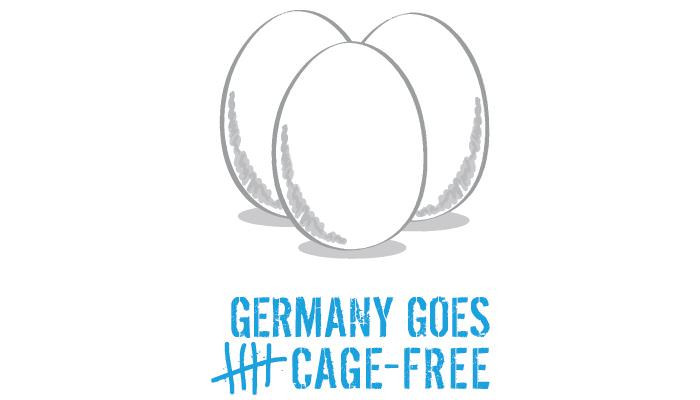Ending the Use of Battery Cages

One of our main corporate outreach programs has been the Cage-Free Initiative that is backed by 13 German animal protection organizations which allow us to negotiate with companies on their behalf.
In the last years, we played the main role in getting food companies to abandon the sale and use of cage eggs (including egg products). The initiative has developed a momentum of its own: Many companies have decided to go cage-free just because their peers did it.
Our cage-free work in Germany is mostly done. When we started, 90% of Germany laying hens were kept in cages. This number dropped 5% and Germany will see a complete ban of all cages for laying hens in 2025 (in cases of hardship in 2028). Since 2016, we have started to take a more international approach: working with the Open Wing Alliance to get international cage-free commitments from food businesses.
Higher welfare-standards in cage-free systems
While getting laying hens out of cages into cage-free environments is a step that reduces suffering, their suffering in cage-free systems is still severe. One important indicator is the necessity for searing (»trimming«) their beaks: The hens are so stressed that they develop behavioral disorders. As a result, feather pecking and cannibalism occur. To make sure that these behavioral disorders do not lead to high mortality rates, the tips of the laying hens’ beaks are cut off. This procedure is painful in the short term and also in the long run. It does not stop the behavioral disorders but it makes sure that mortality rates stay low: seared beaks hardly cause wounds. We are calling for an end to beak searing and for keeping and feeding hens in a way that does not let behavioral disorders occur.
We laid the groundwork to ending beak trimming in Germany by publishing a paper about how beak trimming was ended in Austria and sending it to some of the most important decision makers in the egg industry, the retail sector, and politics. Eventually, this work was successful. A couple of years later we were also able to improve rearing conditions for young hens. This will not only affect the 40 million laying hens in Germany — it will also affect nearly all of the 30 million laying hens in the Netherlands, as well as 10 million more in other European countries. This success has been achieved by working through German retailers to influence the KAT system, since all suppliers to grocery stores in Germany have to comply with the standards of the KAT system. Germany imports a large number of eggs from other European countries because the demand for eggs cannot be satisfied by domestic supply.